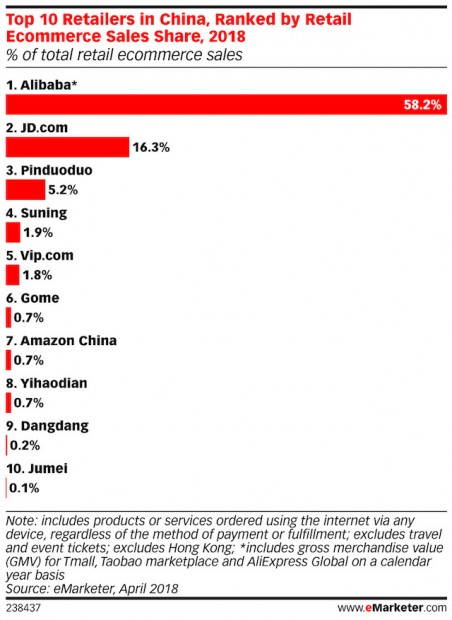 Alibaba and JD may appear to dominate China’s e-commerce market, but new research suggests new players are increasing their influence.
Alibaba and JD may appear to dominate China’s e-commerce market, but new research suggests new players are increasing their influence.
Research house eMarketer has released its ranking of the top 10 e-commerce retailers in China. Combined, they account for more than 85 per cent of all retail e-commerce sales in the country this year. Alibaba predictably takes the top spot, with a 58.2 per cent share, with JD a distant second with 16.3 per cent. Combined, that’s 74.5 per cent.

But beneath Alibaba and JD is a long tail. Fast-rising Pinduoduo, a Groupon-style retailer that mixes in social buying, will rank third this year with a 5.2 per cent share. The site has reached that point in just three years when it debuted with just 0.1 per cent of the market.
Started by a former Google engineer, Pinduoduo allows consumers to buy direct from wholesalers and factories at competitive prices. A key factor in Pinduoduo’s success to date is that it has targeted tier 3 and tier 4 cities, thus attracting new price-conscious e-commerce customers. In addition, Pinduoduo has made it relatively easy for sellers to enter the marketplace.
Monica Peart, eMarketer’s senior director of forecasting, says smaller e-commerce players such as Pinduoduo have benefitted from focusing on smaller tier 3 and 4 Chinese cities and lower, which are less urbanised than top tier cities, yet witnessing rapid e-commerce growth as digital buyers seek more affordable yet genuine products online.
“Buyers in lower-tier cities have been less tolerant of the higher prices found on large players such as Alibaba and JD, but they are quick to seize upon the relative deals found on Pinduoduo’s platform,” she said.
Rising stars
Peart names Gome, Suning and VIPshop as other fast-rising players in China’s e-commerce market.
Gome, an online and offline multichannel retailer that specialises in home goods, will take a 0.7 per cent share of all retail e-commerce sales in China this year. The company, which employs social sharing as part of its marketing strategy, has also begun to use its online data to support its offline offerings.
Electronic retailer Suning has been exploring multichannel integration over the past few years. Peart says this approach has proved profitable so far, and the company will account for nearly 2 per cent of China’s online retail market this year.
And VIPshop is an online discount retailer focused largely on fashion that offers high-quality and popular branded products. Founded in 2008, the company focuses on flash sales and has partnered with well-known players such as WeChat parent Tencent and JD.
“The company has built a sizable base of loyal customers, and we expect VIP.com will take a 1.8 per cent share of retail e-commerce sales in China this year.”
She describes China’s e-commerce marketplace as “dynamic” with consumers welcoming new players which offer popular branded products.
“This means smaller, more specialist players that can offer authentic goods have become credible competitors to Alibaba and JD.”





